Image: The Jawaharlal Nehru Stadium, under renovation for the 2010 Commonwealth Games, in New Delhi, August 12. Rasheeda lives close to the main venue for the Games, an event intended to showcase India's rising global clout
Sheela Bhatt
Sheela Bhatt
Mother of seven Rasheeda Malik's door opens into the drainage of Sarai Kale Khan -- the part slum, part working class colony on the eastern stretch of the Nizamuddin railway station in New Delhi.
One end of Sarai Kale Khan touches the neighbourhood of the Nagli slums, which border the brand new, 1100 crore residential complex for 8,000-plus athletes participating in the Commonwealth Games in October.
Another end of Rasheeda's colony kisses the plot on which the Jawaharlal Nehru stadium, being renovated at a cost of 961 crore as the main venue of the corruption-ridden Commonwealth Games, stands grandly like the new India -- arms akimbo.
...
One end of Sarai Kale Khan touches the neighbourhood of the Nagli slums, which border the brand new, 1100 crore residential complex for 8,000-plus athletes participating in the Commonwealth Games in October.
Another end of Rasheeda's colony kisses the plot on which the Jawaharlal Nehru stadium, being renovated at a cost of 961 crore as the main venue of the corruption-ridden Commonwealth Games, stands grandly like the new India -- arms akimbo.
...
Cash-rich Delhi can't cover up reality
The Sarai Kale Khan area's original name was Kale Khan Ki Sarai. Kale Khan was a medieval Sufi saint who built the rest house (sarai) here for caravans -- going from Chandni Chowk to Mehrauli, now a New Delhi suburb -- to rest.
To transport the athletes from the Games village to the stadium faster, and to protect them from the Indian capital's nerve-wracking traffic jams, Delhi Chief Minister Sheila Dixit's government has built an overpass.
The structure -- from one end of Rasheeda's colony to another -- cost 800 crore in total, but is only partially successful.
When India's VIP guests traverse the overpass, they will not be shielded from the ugly sights of Nagli and Sarai Kale Khan -- the public toilets without water, the innumerable illegal electric connections dangling dangerously and the muddy by-lanes constantly stinking of a concoction of fermented food.
The awe-inspiringly cash-rich Delhi government is on a spending spree to host the Games successfully, to showcase a resurgent India to the world. Blissfully ignorant, Rasheeda argues almost daily with her neighbourhood shopkeeper to sell her mustard oil in small quantities worth 10.
To transport the athletes from the Games village to the stadium faster, and to protect them from the Indian capital's nerve-wracking traffic jams, Delhi Chief Minister Sheila Dixit's government has built an overpass.
The structure -- from one end of Rasheeda's colony to another -- cost 800 crore in total, but is only partially successful.
When India's VIP guests traverse the overpass, they will not be shielded from the ugly sights of Nagli and Sarai Kale Khan -- the public toilets without water, the innumerable illegal electric connections dangling dangerously and the muddy by-lanes constantly stinking of a concoction of fermented food.
The awe-inspiringly cash-rich Delhi government is on a spending spree to host the Games successfully, to showcase a resurgent India to the world. Blissfully ignorant, Rasheeda argues almost daily with her neighbourhood shopkeeper to sell her mustard oil in small quantities worth 10.
Rasheeda's heart-wrenching story
"Our colony," declares Rasheeda, "has people like us. The shopkeepers know who is poor and what it means to be poor. The small traders are just marginally richer than us."
Every week, her children gleefully buy Samosa for 1 from an old woman in her insect-infested lane.
Unable to educate her elder daughter Shahzadi -- or even feed her properly -- Rasheeda married her off at age 16. Rasheeda's eldest son is mentally handicapped. Her third child, Shamsher, is a bully who mostly plays with a pet parrot. He used to work with a caterer to serve food at weddings and parties.
"If you become a waiter you get free food," Rasheeda beams. "He would bring home leftover Chicken Biryani. My other children loved it."
Shamsher lost his job -- and the family the leftover Biryani -- when the catering owner realised Shamsher was a minor. Now he drives an auto rickshaw without a driving license earning about 150 every day -- till the police catch him.
Rasheeda shares her story with heart-wrenching simplicity. She was born in New Delhi, the daughter of a labourer earning Rs 15. She insists they were never sad. In those days, she continues, food was cheap; the joy of family bonding was priceless.
"Bas pyar se rahte the, aur kya? (We were just happy, what else?)"
Every week, her children gleefully buy Samosa for 1 from an old woman in her insect-infested lane.
Unable to educate her elder daughter Shahzadi -- or even feed her properly -- Rasheeda married her off at age 16. Rasheeda's eldest son is mentally handicapped. Her third child, Shamsher, is a bully who mostly plays with a pet parrot. He used to work with a caterer to serve food at weddings and parties.
"If you become a waiter you get free food," Rasheeda beams. "He would bring home leftover Chicken Biryani. My other children loved it."
Shamsher lost his job -- and the family the leftover Biryani -- when the catering owner realised Shamsher was a minor. Now he drives an auto rickshaw without a driving license earning about 150 every day -- till the police catch him.
Rasheeda shares her story with heart-wrenching simplicity. She was born in New Delhi, the daughter of a labourer earning Rs 15. She insists they were never sad. In those days, she continues, food was cheap; the joy of family bonding was priceless.
"Bas pyar se rahte the, aur kya? (We were just happy, what else?)"
'If I keep a fast, who will earn?'
Image: The 48-year-old Nizamuddin dargah
It never occurred to her poor parents to send her to school. "Woh zamana alag tha (It was a different era)."
This week, the world is celebrating a new India. An India where online social networking, cell phones and 24/7 television channels trumpet 21st century modernity. It sounds intelligent and positive when you talk about how a juggernaut of a country is on its way to global prominence in a new era.
But the idea of time is deceptive. For more than 850 million Indians -- families like Rasheeda's -- time, or the counting of centuries, is a meaningless exercise. If you tell Rasheeda that today is August 12, 1921, she will not dispute it. Nor does it matter to her. What matters is getting to work on time every day. Period.
She sincerely cleans rich people's homes, polishing the floors till they shine like new. She washes about five buckets of clothes every day -- till they seem laundry starched. She does it happily, energetically. She has had seven children, but her body is still sturdy.
She thanks Allah for that, but regrets that she has no time to go to a mosque or to the nearby, 448-year-old Nizamuddin dargah to say thank you to the greatest of Sufi saints. She doesn't offer namaz nor can she afford to observe roza (fast) during the holy month of Ramzan, which is on now.
"If I fast," she says, "who will earn?"
She learned the importance of hard work during her stint in the village farmlands of Uttar Pradesh. Now, she earns 6,200 every month. She has huge debts. She does not even know for sure how many people she has borrowed money from -- nor does she count when she pays off a loan.
This week, the world is celebrating a new India. An India where online social networking, cell phones and 24/7 television channels trumpet 21st century modernity. It sounds intelligent and positive when you talk about how a juggernaut of a country is on its way to global prominence in a new era.
But the idea of time is deceptive. For more than 850 million Indians -- families like Rasheeda's -- time, or the counting of centuries, is a meaningless exercise. If you tell Rasheeda that today is August 12, 1921, she will not dispute it. Nor does it matter to her. What matters is getting to work on time every day. Period.
She sincerely cleans rich people's homes, polishing the floors till they shine like new. She washes about five buckets of clothes every day -- till they seem laundry starched. She does it happily, energetically. She has had seven children, but her body is still sturdy.
She thanks Allah for that, but regrets that she has no time to go to a mosque or to the nearby, 448-year-old Nizamuddin dargah to say thank you to the greatest of Sufi saints. She doesn't offer namaz nor can she afford to observe roza (fast) during the holy month of Ramzan, which is on now.
"If I fast," she says, "who will earn?"
She learned the importance of hard work during her stint in the village farmlands of Uttar Pradesh. Now, she earns 6,200 every month. She has huge debts. She does not even know for sure how many people she has borrowed money from -- nor does she count when she pays off a loan.
The day her innocence died
Out of her income, 1,500 goes to the landlord who owns the room with a tin shelter and mud floor. She manages her family with 5,700.
She works for eight hours in four homes, then returns home to cook and do household chores for her six children and unemployed, husband Hadees. He is uneducated, unskilled and without any motivation or purpose in life. Like millions of poor women in India, she bears her husband's burden.
"My father sheltered me and my six sisters," Rasheeda says. "I was quite happy and innocent till I got married. When I was married into Hadees's family, I was asked to shift to Sathni village near Aligarh. After a few days of marriage my watch was stolen. I told my sister-in-law about it."
Rasheeda was shocked when her sister-in-law told her to ask her husband about it. Hadees had stolen her watch within a week of their marriage. He was a habitual gambler. She did not know what gambling meant. He returned the watch, telling Rasheeda how lucky she was that on that day he didn't lose in teenpatti (a card game).
Next week, he came home late with a plastic bag full of some liquid. Rasheeda didn't know what it was. She called her father-in-law to help his son and her husband, who was unable to stand. It was another revelation for her -- that her husband was an alcoholic; that the liquid in the plastic was the cheapest spirit available. That was the end of her innocence.
She works for eight hours in four homes, then returns home to cook and do household chores for her six children and unemployed, husband Hadees. He is uneducated, unskilled and without any motivation or purpose in life. Like millions of poor women in India, she bears her husband's burden.
"My father sheltered me and my six sisters," Rasheeda says. "I was quite happy and innocent till I got married. When I was married into Hadees's family, I was asked to shift to Sathni village near Aligarh. After a few days of marriage my watch was stolen. I told my sister-in-law about it."
Rasheeda was shocked when her sister-in-law told her to ask her husband about it. Hadees had stolen her watch within a week of their marriage. He was a habitual gambler. She did not know what gambling meant. He returned the watch, telling Rasheeda how lucky she was that on that day he didn't lose in teenpatti (a card game).
Next week, he came home late with a plastic bag full of some liquid. Rasheeda didn't know what it was. She called her father-in-law to help his son and her husband, who was unable to stand. It was another revelation for her -- that her husband was an alcoholic; that the liquid in the plastic was the cheapest spirit available. That was the end of her innocence.
Her children were unwelcome in a private school
She started working in farms as a seasonal, daily labourer and earned 35 a day. Within three months after the birth of every child, she got pregnant. She says the quack in her village gave her birth-control medicines that never worked. Her youngest child is 5. With seven children she could not manage her life in Sathni village. She migrated back to New Delhi.
In New Delhi a kind lady neighbour took her to hospital for "an operation" -- her first encounter with new India's changing times. If the idea of time and date, day or year has any relevance in Rasheeda's life, it is limited to the fact that her fourth and fifth children went to school for the first time at age 8. That too was not without struggle.
One of her employers -- with local political clout -- got her two children admitted in a private school in the area. Initially, her two youngest children had no official names. Neither does she have their birth certificates, nor any proof of residence. The family does not exist on paper -- not uncommon for millions even in 21st century India.
Since they have no official identity, they don't get any government help.
A kind school principal, Sulekha Mehra, gave Rasheeda's boys names like Danish and Aseem, eight years after they were born. Why didn't Rasheeda give them proper names? "Zaroorat kya hai (what's the need)?"
A week later, the kind principal realised that one of Rasheeda's two children was actually a girl. She was given a new name: Daneesha. The children's classmates abhorred them: Because their hair was unkempt, they had lice; because they were undisciplined; because they ate dirty food. They were unwelcome in a private school where children from middle-class families went to.
Luckily, one of the school's mentors cajoled the teachers into letting the children study on. 'India doesn't have enough resources for one-billion-plus people,' the kind man reasoned. 'Rasheeda is poor, and people like us who are well-off should bear with her children. If possible, thank her.'
In New Delhi a kind lady neighbour took her to hospital for "an operation" -- her first encounter with new India's changing times. If the idea of time and date, day or year has any relevance in Rasheeda's life, it is limited to the fact that her fourth and fifth children went to school for the first time at age 8. That too was not without struggle.
One of her employers -- with local political clout -- got her two children admitted in a private school in the area. Initially, her two youngest children had no official names. Neither does she have their birth certificates, nor any proof of residence. The family does not exist on paper -- not uncommon for millions even in 21st century India.
Since they have no official identity, they don't get any government help.
A kind school principal, Sulekha Mehra, gave Rasheeda's boys names like Danish and Aseem, eight years after they were born. Why didn't Rasheeda give them proper names? "Zaroorat kya hai (what's the need)?"
A week later, the kind principal realised that one of Rasheeda's two children was actually a girl. She was given a new name: Daneesha. The children's classmates abhorred them: Because their hair was unkempt, they had lice; because they were undisciplined; because they ate dirty food. They were unwelcome in a private school where children from middle-class families went to.
Luckily, one of the school's mentors cajoled the teachers into letting the children study on. 'India doesn't have enough resources for one-billion-plus people,' the kind man reasoned. 'Rasheeda is poor, and people like us who are well-off should bear with her children. If possible, thank her.'
She has never heard the names Rahul or Manmohan
It has taken three years to instil some cleanliness into her school-going children. And that was possible only after Rasheeda realised that her naughty children were changing, and behaving better.
So, she promised the school management that she would try to wash their school uniforms every day and also ensure that they bathed before going to school. That is the only miracle that has happened in her life.
Her two youngest children, Sapan and Arif, now go to madrassas -- because she knows well that in the glitter of new India's private schools, her unclean, unkempt children are not welcome.
Rasheeda has never heard the names Rahul Gandhi or Manmohan Singh. How is that possible? "Time kahan hain? (Where is the time?)"
With rice at 22 (44 cents), dal at 40 (80 cents) and wheat flour at 5 (10 cents) per kg, she says her family eats vegetables only when somebody tips her out of turn.
So, she promised the school management that she would try to wash their school uniforms every day and also ensure that they bathed before going to school. That is the only miracle that has happened in her life.
Her two youngest children, Sapan and Arif, now go to madrassas -- because she knows well that in the glitter of new India's private schools, her unclean, unkempt children are not welcome.
Rasheeda has never heard the names Rahul Gandhi or Manmohan Singh. How is that possible? "Time kahan hain? (Where is the time?)"
With rice at 22 (44 cents), dal at 40 (80 cents) and wheat flour at 5 (10 cents) per kg, she says her family eats vegetables only when somebody tips her out of turn.
'Sarkar ko bolo Dal-Roti sasta karein'
She says for her six children and her husband, she needs more than a kilo of rice everyday. And she can only stretch her salary so far. Decades ago, her colony Sarai Kale Khan was a Gujjar village.
"Don't talk about the Gujjars," Rasheeda says. "They have buffaloes and cows. They earn big money. They sell their milk at Rs 40 a litre. Out of that money they build illegal houses in our colony."
Over time, hundreds of illegal houses -- if you can call them that -- were built here by the Gujjars, supported by corrupt politicians and the land mafia. They rent out rooms to migrants who work in the colony to the west of Nizamuddin station and elsewhere in posh south Delhi. Neither the land mafia nor the government provides any other facilities without bribes.
'Illegal colonies' are a fail-proof business. Every day hundreds of drivers, gardeners, dhobis, maidservants, masseurs, carpenters, tailors, rag-pickers, motor mechanics and rickshaw pullers start their day from Sarai Kale Khan's illegal colonies at 6 am, and return only after some 14-plus hours of hard work. In the entire colony -- just 15 minutes' drive from the official residence of India's Prime Minister Manmohan Singh and 20 minutes' drive from India's parliament -- electricity supply is erratic, and mostly illegal.
No tenant of these filthy, dark rooms gets water; nor are the public toilets cleaned every day. Rasheeda shoos out her children from her room so that she can bathe. "The children don't need privacy," she says. "They bathe with the Gujjars' buffaloes." Rasheeda has not heard of concepts like social security. Nor does she have any idea that free or cheap rations are available to the poor through the government's public distribution system.
"Sarkar ko bolo Dal-Roti sasta karein (tell the government to make food items affordable)," she says.
"Don't talk about the Gujjars," Rasheeda says. "They have buffaloes and cows. They earn big money. They sell their milk at Rs 40 a litre. Out of that money they build illegal houses in our colony."
Over time, hundreds of illegal houses -- if you can call them that -- were built here by the Gujjars, supported by corrupt politicians and the land mafia. They rent out rooms to migrants who work in the colony to the west of Nizamuddin station and elsewhere in posh south Delhi. Neither the land mafia nor the government provides any other facilities without bribes.
'Illegal colonies' are a fail-proof business. Every day hundreds of drivers, gardeners, dhobis, maidservants, masseurs, carpenters, tailors, rag-pickers, motor mechanics and rickshaw pullers start their day from Sarai Kale Khan's illegal colonies at 6 am, and return only after some 14-plus hours of hard work. In the entire colony -- just 15 minutes' drive from the official residence of India's Prime Minister Manmohan Singh and 20 minutes' drive from India's parliament -- electricity supply is erratic, and mostly illegal.
No tenant of these filthy, dark rooms gets water; nor are the public toilets cleaned every day. Rasheeda shoos out her children from her room so that she can bathe. "The children don't need privacy," she says. "They bathe with the Gujjars' buffaloes." Rasheeda has not heard of concepts like social security. Nor does she have any idea that free or cheap rations are available to the poor through the government's public distribution system.
"Sarkar ko bolo Dal-Roti sasta karein (tell the government to make food items affordable)," she says.
She pays less rent due to the open gutter
Meanwhile, real estate marketing campaigns inform us -- via cell phone text messages -- that the newly built flats and bungalows for athletes are now available for sale: Anything between 2 crore and 5 crore.
But even the residents of Sarai Kale Khan find their colony expensive.
Gujjar landowners rent their rooms at 2,000 to 2,500. Rasheeda's family of nine lives in a 200-square-foot one.
She pays less because of the open gutter -- the stench saves her 500 ($10), a huge amount for her. Every morning she opens her door and the gutter greets her.
"It's okay," she smiles. "I get good sleep. Why worry then?"
Sheela Bhatt is Editorial Director, News, Rediff.com
But even the residents of Sarai Kale Khan find their colony expensive.
Gujjar landowners rent their rooms at 2,000 to 2,500. Rasheeda's family of nine lives in a 200-square-foot one.
She pays less because of the open gutter -- the stench saves her 500 ($10), a huge amount for her. Every morning she opens her door and the gutter greets her.
"It's okay," she smiles. "I get good sleep. Why worry then?"
Sheela Bhatt is Editorial Director, News, Rediff.com

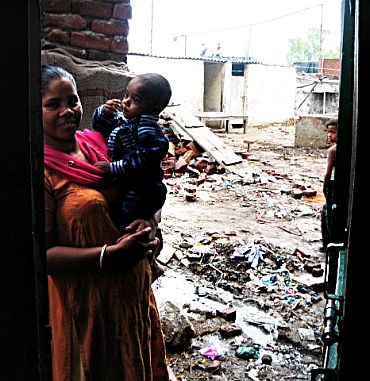
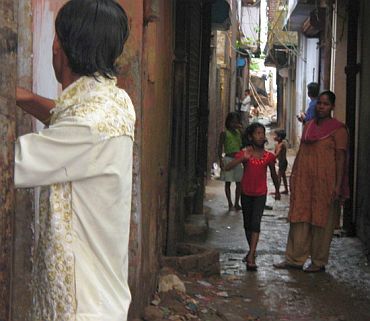
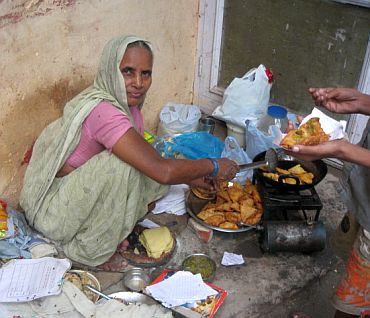
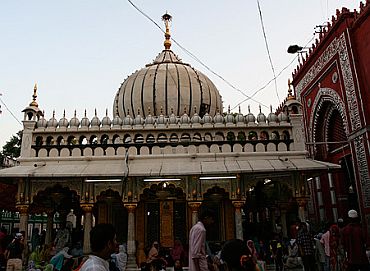
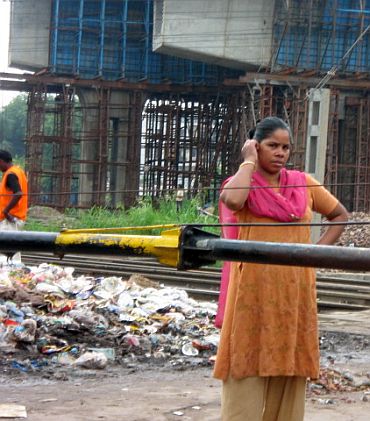
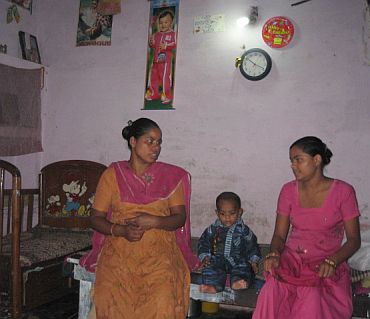
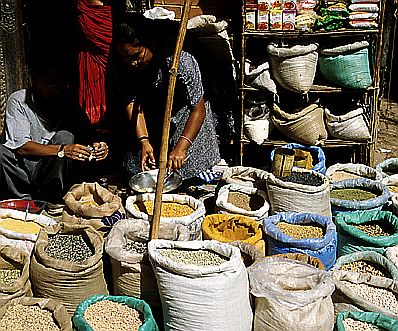
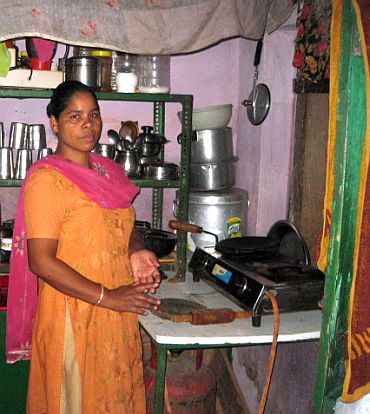
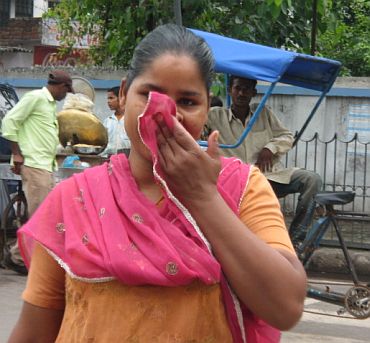
article